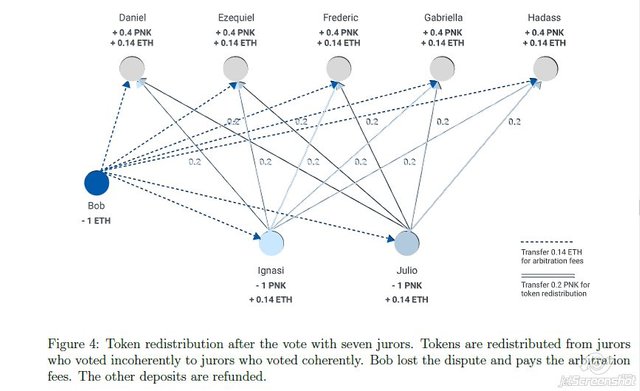
All problems of the world arise from conflicting interests among individuals. The major reason for this phenomena stems from the sheer knowledge that people and their businesses need to survive. For instance; I could remember stumbling upon Google ad last year displaying a set of stud earrings sold for half the price which to me felt like a really good deal. I quickly placed my order for five packets of these earrings and paid for them. Four days later, I was contacted by the e-commerce agent to come to pick my order. Instead of the 8mm size of stud earrings, I ordered online, I got the 3mm size, which was too small and of inferior quality. I was pissed and asked for a refund, but the agent said he could do nothing about it because this was exactly what I ordered. Come to think of it, I think the merchant just placed that ad in order to quickly dispose goods people were not purchasing, while I have lost money having those earrings sitting in my drawer collecting dust.

This is one scenario out of so many that occurs with the rising trend of economic activity operating online. People are bound to have situations where they are given packages that are either damaged or totally different from what they ordered, or they could get really poor service from service providers whom they can't hold accountable.

How would customers and consumers in online markets with little or no bureaucratic systems ensure they get maximum satisfaction?
In 2017, Frederico Ast came up with kleros, a decentralized court system for the internet using the system ancient Greeks solved their disputes in a democratic manner.
"In the 5th century BCE, the Greeks had a different concept of justice than we have now," Ast explained. "They didn't have lawyers or judges, but they had the idea that ordinary citizens had a right to judge in a trial."
On trial days, Greeks who wanted to be on the jury would take a bronze plate called a pinakion to court and place it in a big stone block with many slots called a kleroterion. This word inspired the name for Ast's company: kleros is "chance" and terion roughly translates to "altar." Therefore, kleroterion is the "altar of chance."
An official from the justice system would select jurors by throwing white and black balls onto the kleroterion. If the row containing your pinakion had a white ball, you were on the jury. A black ball meant you were dismissed. This system kept the jury selection process fair and transparent, plus it prevented tampering."
Source forbes

How kleros works
Let's say an entrepreneur in Nigeria pays a web developer in the US $1,200 to design a website for him, and it turns out that the entrepreneur is not satisfied with the website the web developer delivered to him, it would be incredulous traveling to the US on short notice to sue the developer for $1200. With kleros, the entrepreneur places the funds in a smart contract and the funds would be transferred to the web developer once the client (entrepreneur) is satisfied with the job. However, in the case of any dispute or misunderstanding, the funds would stay locked in the smart contract and kleros would select a jury of website experts. After a series of analysis on the evidence by the jurors and votes have been passed on who is right or wrong in the case, the jurors get paid for participating in the judicial process.
The sweetest part about this deal is the Bribe Resistance kleros offers.
Let us also consider a scenario where a guilty party refuses to accept his wrongs but goes on to bribe the jury to have the ruling in his favor. He would have to bribe all the jurors all the way to the General Court, which would be at a very steeply rising cost. The downside, however, is that he (guilty party) will likely lose in the end because he would have to bribe token holders holding more than 50% of the pinakions in total, which in almost all cases would exceed the value at stake in the dispute. A successful bribe of the general court will dramatically decrease the value of the reputation tokens (who wants his contracts to be arbitrated by a dishonest court?).
Also, kleros ensures fairness through its incentive system
Jurors rule disputes for the arbitration fees. The incentive system makes them rule honestly because at the end of a dispute juror whose votes aren't coherent with the group will lose some token which will be given to coherent jurors. After kleros has reached a decision on the dispute, tokens are unfrozen and redistributed among jurors. The redistribution mechanism is inspired by the Schelling Coin, where jurors gain or lose tokens depending on whether their vote was consistent with the others jurors. When a jury member votes coherently, it means he voted with the majority. The amount of tokens lost per incoherent juror is α-min_activate - weight. The α parameter determines the number of tokens to be redistributed after a ruling. It is an endogenous variable that will be defined by the governance mechanism as a consequence of the internal dynamics of the voting environment. The min activate parameter is the minimum amount of token which can be activated in the sub-court. The tokens are divided between the coherent parties proportionally to their weight. Parties are considered coherent if they voted as the majority. Jurors could fail to reveal their vote in a particular case. In order to disincentivize this behavior, the penalty for not revealing one's vote is twice as large as the penalty for voting incoherently (2-α-min_activate.weight). This incentivizes jurors to always reveal their vote. In case of appeal, the tokens are redistributed at each level according to the result of the final appeal. If at one level no one voted coherently, the tokens are given to the winning party.
When there is no attack, parties are incentivized to vote what they think, ignoring what other parties think, which is honest and fair


Moving on, these are disputes that can be resolved through kleros:
Disputes on Escrow: A client or customer could pay for an off-chain good or service, by putting the funds in a smart contract. In the case of a dispute, kleros can be used to have the smart contract to reimburse the buyer or pay the seller. Although it can get complex in the situation of a rental agreement where the renter will be required to pay deposit. In case the property is reported damaged and the renter doesn't agree on compensation, a dispute can be created by the owner to claim part of the security deposit.
Dispute on Micro Tasking: Taskers would put a security deposit and submit answers to micro-tasks. The tasks would be replicated. If a task gets different answers, taskers could admit their mistake, this would transfer a part of the security deposit to the taskers who performed the task correctly. In case multiple taskers stay in their position, a dispute resolution process would ensue and the losing taskers would have part of their security deposit transferred to the winning ones.
Disputes on Insurance: The insuree will pay a fee to the insurer to get compensation in case particular event would happen. The insurer will have to put some security deposit which could be common to multiple insurees (respecting risk management rules). When an insured event happens, the insurer can validate it and compensate the insuree. If the insurer does not validate the event, a dispute resolution process would ensue. If the insuree wins the dispute resolution process, funds from the security deposit of the insurer would be transferred to the insuree. In case the security deposit is linked to multiple insurees claiming more than the deposit, a dispute resolution process would also be needed to determine how those funds should be split between insurees.
Disputes on Oracle: A party (which can be a smart contract) asks a question. Everyone can give a deposit and submit an answer. If everyone gives the same answer, it is returned by the Oracle. If there are multiple answers, a dispute resolution procedure ensues. The Oracle returns the answer given by the dispute resolution process and parties who put wrong answers lose their deposits which are given to honest submitters.
Disputes on Social networks: Preventing spam, scams and other abuses is a challenge for decentralized social networks. Parties can report violations of the network policies and put a security deposit. If the violation is contested, a dispute resolution process ensues. If it is ruled that no violation happened, the reporter loses his security deposit to the accused party. If the violation is not contested or confirmed by kleros various effects can be implemented: the content can be removed, the content poster can lose a sign-up deposit and the reach of his other posts can be lowered.
More benefits of kleros as regards cost reduction associated with dispute resolution and how it can benefit small businesses and large corporations (such as eBay, Etsy, Amazon etc.)
Every business owner whether of small or large businesses sees legal issues as a kick in the gut: from dealing with legal personnel who do not fully comprehend disputes in the internet age to going through the process of scanning through stacks and stacks of recorded transactions just to solve a case is enough to make anyone scram. However, with kleros, the stress is reduced.
For small businesses, the costs of legal fees are drastically reduced because the skillful jurors will resolve the disputes between them and their clients at an affordable price.
Larger businesses, in spite of being able to afford legal fees, they would enjoy settling disputes directly with the jurors thereby saving them the time they waste in dispute resolution.

In conclusion
"The Inability of legal systems to solve the disputes of the Internet Age led platforms such as eBay or Alibaba to develop their own arbitration mechanisms. However, no horizontal system emerged to be used across the board and that could gain from increased specialization over time. kleros seeks to become this system.
While kleros relies on cutting-edge technologies in blockchain, cryptography, game theory and collective intelligence, its fundamental logic is still based on a principle the Greek knew 25 centuries ago: justice can be served on a peer-to-peer basis. Cryptocurrency is helping advance the cause of financial inclusion. Justice inclusion is an equally important goal. Just as cryptocurrency is bringing banking for the unbanked, the kleros promise is to bring justice for the unjusticed."
Federico Ast on Medium.

For More Info
Kleros Website
Kleros WhitePaper
Kleros Medium
Kleros Youtube
Kleros Telegram
Kleros Twitter
Kleros Github
Kleros Forum

kleros Team


kleros Advisor


kleros Partners
.jpg)

Referece
this contest is sponsored by @originalworks click to participate

This post has been submitted for the @OriginalWorks Sponsored Writing Contest!
You can also follow @contestbot to be notified of future contests!
Downvoting a post can decrease pending rewards and make it less visible. Common reasons:
Submit